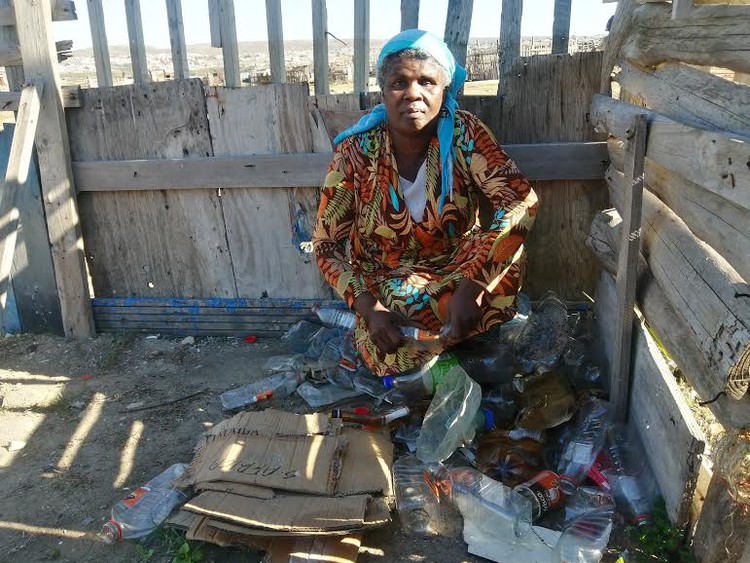No vegetables, no fruit: surviving without the Covid-19 grant
Nocawa Maneli of Gqeberha lives off pap and rice supplied by relatives
Nocawa Maneli, who has an injured leg from a dog bite years ago, depended on the Covid-19 grant. Now she depends on the kindness of relatives. Photo: Mkhuseli Sizani
- The termination of the Covid-19 grant at the end of March has left neighbours Nocawa Maneli and Tembeka Zingela struggling to survive.
- The two women from Missionvale in Gqeberha both lost their jobs at the start of the pandemic.
- Without the grant, they live on pap, rice and flour supplied by relatives and go to a local soup kitchen. Fruit and vegetables are a luxury.
- Tembeka collects used containers in the township for recycling, in exchange for food.
Nocawa Maneli, 58, no longer buys vegetables. She says she can’t afford to, since the R350-a-month Covid-19 grant on which she depended came to an end in March.
Maneli, from Missionvale in Gqeberha, lost her job as a domestic worker during the start of the lockdown. The Covid-19 grant, she says, was small, but made “a huge difference”.
She used to spend R40 going to the post office to collect the grant. “With the rest I would buy 2kg of rice for R28, maize meal R20, vegetables R50, soup pack R20, 5kg bread flour R55, cooking oil R20, electricity R20, washing powder R5, and bath soap R7.”
“I used to have a cup of tea and porridge in the morning, rice and vegetables for supper; sometimes vetkoek and baked bread with tea or rice mixed with potatoes in one pot with a drop of cooking oil.”
“The food would last me two weeks. Then I would have to call my relatives to bail me out until I receive my next grant,” she said.
Now, she says, she depends entirely on her relatives. “I eat stiff pap with imana soup or sometimes eat it with rice.” She eats meat once a month when her relatives buy her some.
Occasionally, she says, her neighbour Tembeka Zingela has vegetables, and then “if I have bread flour, we cook dumplings mixed with her vegetables”.
But Zingela too is battling without the Covid-19 grant.
“The R350 grant has been our source of income for me and my boyfriend. Both of us were receiving it. It made a huge difference in our lives because he lost his job in 2014 and since then he has been unemployed. I lost my job at the start of the lockdown. I was working three days as a domestic worker.”
Now Zingela, 56, and her boyfriend have to rely on relatives who give them R100 a month each to buy food, and on the Missionvale Care Centre’s soup kitchen.
“We only buy 5kg of rice, mielie meal and bread flour. Then we go three times a week to the soup kitchen to get bread and soup. When we go there we don’t cook; we save the little food we have. We eat half of the bread with soup and share the other half with our two dogs and cat.”
The couple also collect soft drink containers, tins and cardboard boxes from neighbours for recycling at the Care Centre. In exchange they get samp, rice and mielie meal to cook at home.
Tembeka Zingela collects material for recycling which she exchanges for food to cook. Photo: Mkhuseli Sizani
In her budget speech on 24 May, Minister of Social Development Lindiwe Zulu said that the government’s Covid-19 relief measures had reduced the percentage of households living below the food poverty line of R561 a month from 20.6% to 18.8%. In the absence of these measures, she said, this percentage would have grown to more than 32%.
When she was working, Maneli used to buy a packet with a banana, an orange and an apple for R10. Then when she lost her job she relied on one of the pig owners in the area who would bring her some of the bruised fruit from the stalls where he collects food for the pigs.
“But since winter has started it has been hard to get fruit. The last time I had an orange was last week on Monday given by one of the neighbours.”
Support independent journalism
Donate using Payfast

Next: Upington residents battle to get to vaccination site
Previous: Gqeberha crèche shuts down because of sewage overflow
© 2021 GroundUp. This article is licensed under a Creative Commons Attribution-NoDerivatives 4.0 International License.
You may republish this article, so long as you credit the authors and GroundUp, and do not change the text. Please include a link back to the original article.
We put an invisible pixel in the article so that we can count traffic to republishers. All analytics tools are solely on our servers. We do not give our logs to any third party. Logs are deleted after two weeks. We do not use any IP address identifying information except to count regional traffic. We are solely interested in counting hits, not tracking users. If you republish, please do not delete the invisible pixel.


